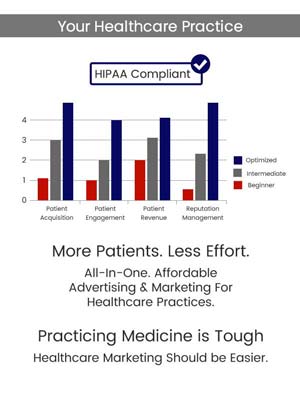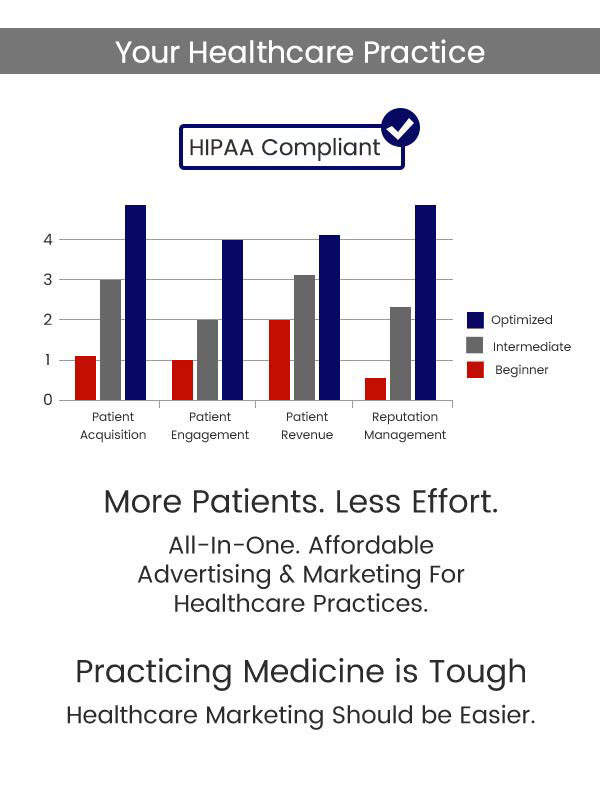Top HIPAA Compliant Medical Marketing Expert Companies in USA Provide an Essential Service
There are over 202,536 dentists and over 1,109,460 physicians, this is 1,311,996 healthcare professionals in USA alone. Adding Canada will make this over 1.5 million providers.
There are certain features you should look for in any modern AI based HIPAA compliant healthcare medical marketing company. There are 6 features you should look for, and 8 important questions. Patientgain.com medical marketing solution is used by the top healthcare practices in the USA & Canada – from coast-to-coast. Typical costs $799/mon to $1999/mon. A good medical marketing company should provide 1) Service that suits your practice’s marketing needs 2) Should provide quality service that earns your trust 3) Service should provide you options, at reasonable pricing 4) Technology and AI that provides live conversion tracking dashboards so you can see performance at anytime 5) Customer service that is responsive and knowledgeable 6) Provides strategy and assist with Unique Selling Proposition (USP).

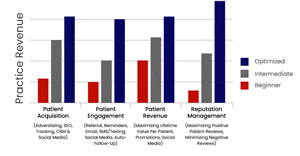
Table of Contents:
1) Is it possible to find a good healthcare marketing company with transparent prices, located in US?
2) List of Top Medical Marketing Companies in USA
3) Medical marketing can be offline (traditional) or online (Digital), both are important.
4) 9 Important Questions For HIPAA Compliant Healthcare Marketing Companies:
5) Is The healthcare marketing company results focused or marketing focus?
6) Is the healthcare marketing company focused on healthcare only or do they have “Other” focus?
7) Is the healthcare marketing company focused on providing you services or software? There are 2 very important components of medical marketing, service and software.
8) Is the healthcare marketing company focused on providing you with a search engine optimization?
9) Is the healthcare marketing company focused on providing you with a search engine marketing (SEM)?
10) Is the healthcare marketing company providing you live intelligent medical marketing dashboards or a monthly report?
11) Is the healthcare marketing company focused on providing you with a medical marketing automation apps?
12) Is the medical marketing company HIPAA compliant and issue a BAA to your practice?
13) How easy is it to contact your medical marketing company?
14) Why is this important?
15) No 1) Ignoring The Digital Change
16) No 2) Accept it, and do the minimum to stay relevant.
17) No 3) They are competing and winning in the digital age
18) Why is PatientGain so successful?
Is it possible to find a good healthcare marketing company with transparent prices, located in US?
Good medical marketing companies with reasonable prices and good customer service are rare. But they do exist.
A healthcare marketing agency is a specialized service firm that focuses exclusively on providing marketing and advertising services to healthcare organizations such as hospitals, medical practices, health-tech, pharmaceutical companies, and medical device manufacturers.
✔ Increase patient inquiries through digital advertising, SEO, and social media.
✔ Improve online visibility with high-quality content and local SEO.
✔ Increase patient conversions by using AI based marketing apps for healthcare practices.
✔ Build patient trust with reputation management and educational marketing.
✔ Streamline patient acquisition with live marketing dashboard and leads funnel tracking.
✔ Ensure compliance with HIPAA, FDA, FTC, and ADA regulations.
✔ Improve your online reputation using technology and ethical strategies.
By leveraging these strategies, medical practice marketing companies help clinics attract more patients, improve brand recognition, and boost long-term success.
List of Top Medical Marketing Companies in USA
Top healthcare marketing companies in the USA by revenue, highlighting their specialties, market strengths, and notable facts. However, if you are a medical or a dental practice in USA or Canada, with less than 200 locations, you can consider PatientGain.
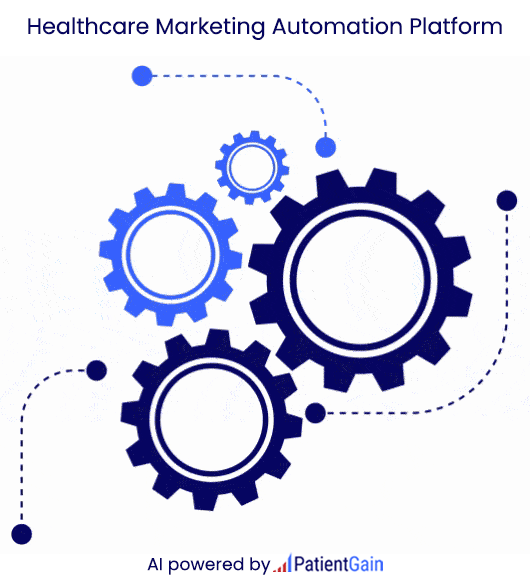
Example 1: Results based and ROI based live dashboards. Asthma and allergy practice with 3 locations. One of the most competitive areas in the US South. For example, if you look at the data, in the month of April, 1045 new leads were received. Customer is using PLATINUM Service.
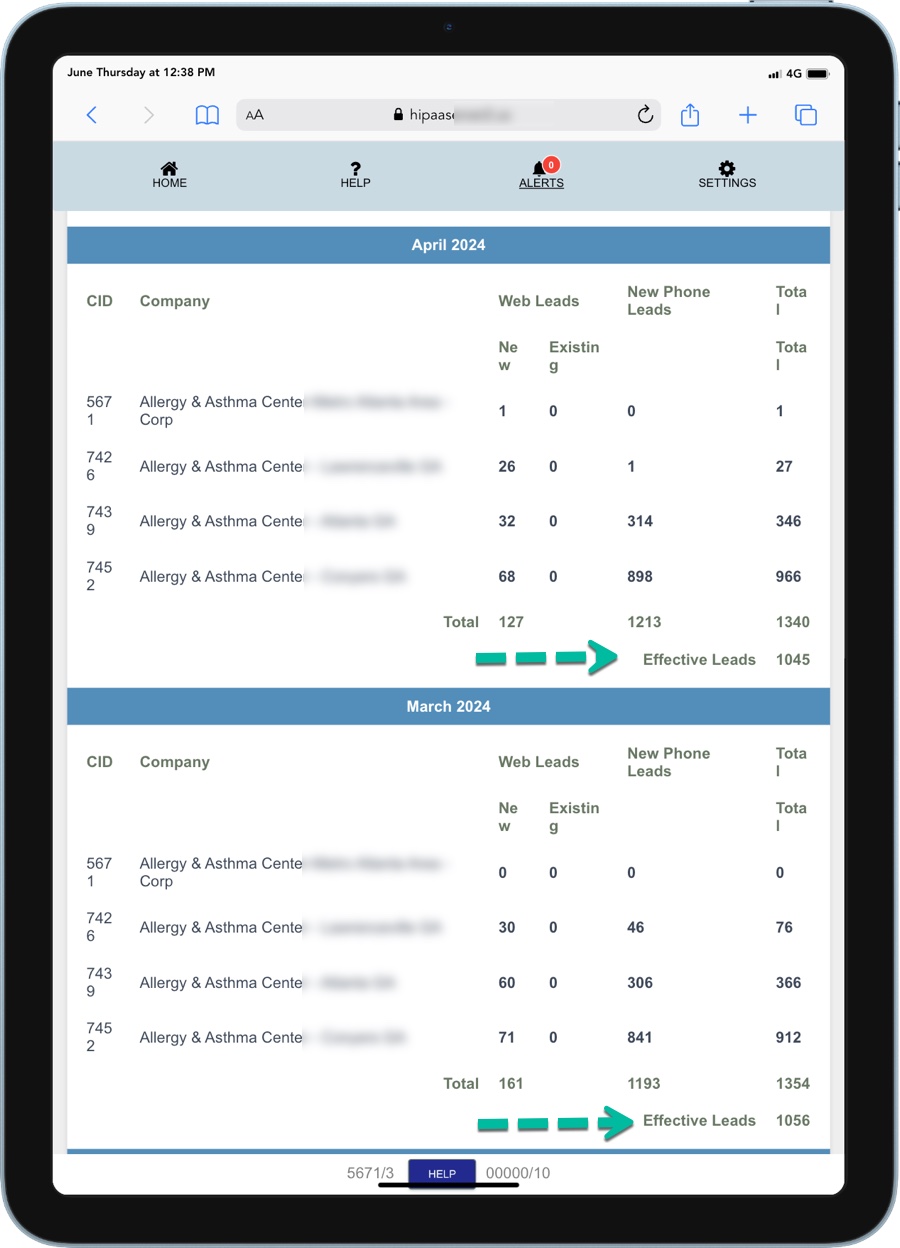
The source of these leads is below. 9034 human beings visited the website. 76 % of the leads were generated from SEO (Search Engine Optimization) or Organic, Free clicks. 22 % know about the practice so they came to the website directly. This means that SEO for this medical practice is working very effectively and and producing excellent ROI (Return On Investment). This practice is using PLATINUM service.
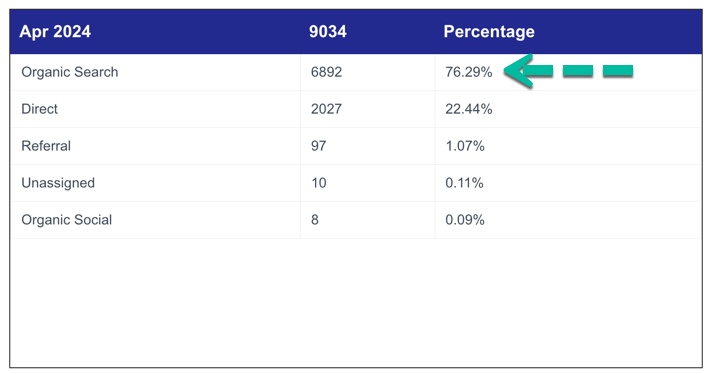
Key Features to Look for in a Modern HIPAA compliant Healthcare Medical Marketing Company: When selecting a healthcare marketing company, it’s crucial to ensure they possess the right expertise, strategic approach, and comprehensive services to effectively promote your healthcare services. Here are the key features to consider:
Industry Expertise
- Specialization in Healthcare: The company should have a proven track record of success in marketing healthcare services. Look for case studies and testimonials from satisfied clients in your specific healthcare niche (e.g., cardiology, dentistry, pediatrics).
- Understanding of Healthcare Regulations: Healthcare marketing is subject to specific regulations. Ensure the company understands HIPAA compliance and avoids any misleading or unethical advertising practices.
- Data-Driven Marketing: The company should utilize data analytics to track campaign performance, measure ROI (Return on Investment), and optimize strategies for better results.
- Focus on Patient Acquisition and Retention: They should develop a comprehensive strategy to attract new patients and cultivate loyalty among existing ones. This might involve website optimization, patient engagement campaigns, and reputation management.
- Omnichannel Marketing: The company should create campaigns that reach your target audience across various channels like search engine optimization (SEO), social media marketing, email marketing, and potentially even traditional media depending on your goals. Basically, they should offer a comprehensive digital marketing solution
- Medical SEO: Expertise in healthcare-specific SEO to improve search engine rankings. Medical and dental SEO is very difficult and requires dedication to healthcare to really create useful ROI for your practice.
- PPC Advertising on Google and Social Media Advertising: Skilled in creating and managing PPC campaigns on platforms like Google Ads and Bing Ads.
- Content Marketinghttps://www.patientgain.com/content-marketing-strategies: Ability to create engaging, educational, and compliant content tailored to the healthcare audience.
- Social Media Marketing: Proficiency in managing social media campaigns across platforms like Facebook, Instagram, LinkedIn, and Twitter.
Patient-Centric Marketing Approach - Personalization of messaging and social posts: 1) Strategies focused on patient acquisition, engagement, and retention. 2) Personalization of marketing messages to cater to different patient demographics and needs.
Analytics and Reporting - Advanced analytics and live dashboards: Advanced analytics capabilities to track campaign performance. Transparent and comprehensive reporting with actionable insights. Brand Development and Management
- Brand Consistency: Expertise in building and maintaining a strong, credible brand image. Consistency in messaging across all marketing channels.
- Online reputation apps for medical and dental practices: Online reputation management can be a headache or a winning strategy for doctors & healthcare clinics. Only 28 percent of the time it is patient-physician related. 72% Of the patients who are unhappy and who post negative feedback on Google and Yelp are not doing so because of the patient-physician experience; they are unhappy due to billing issues, incorrect deductible payment, rude front desk person, lack of perceived patient focus, improper handling of the paper-work, long wait time or impolite response from a clinic staff member ( non-physician ). 28% of the time it is patient-physician related. However, more than 80% of the patients looking for providers look at the Google review overall ratings, and consider these ratings on Google search, before making a decision to contact a provider.
- User-Friendly and High Conversion Medical and Dental Websites: Creation of user-friendly, mobile-responsive, and SEO-optimized websites. Integration of features like appointment scheduling, patient portals, and telehealth capabilities.
- Regulatory Adherence: Compliance and Security – HIPAA
o Adherence to all relevant healthcare marketing regulations and guidelines.
o Ensuring the security and privacy of patient information in all marketing activities. - Latest Trends:
o Use of the latest digital marketing trends and technologies.
o Continuous adaptation to changes in the healthcare industry and digital marketing landscape.
Client Testimonials and Case Studies - Proven Track Record:
o Proven track record demonstrated through client testimonials and case studies.
o Examples of successful campaigns and measurable results.
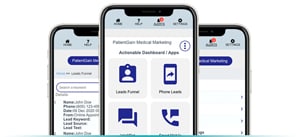
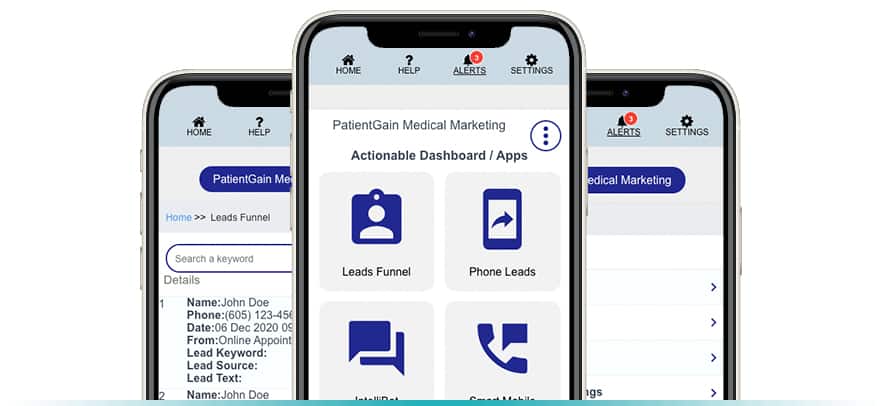
Our society is turning into a Digital Society. Healthcare Medical industry is also changing. More and more people are on mobile devices, on the internet, on social media, and reading their Emails on a mobile device. Just look around you. At a traffic stop light, look to your left, you will probably see a woman checking her Email on her iPhone, look to your right, you will probably see a man sending a text or responding to one while waiting for the red light to turn green. Not a good idea while you driving, but it is happening. You will also see more and more people using devices like Siri and Digital Personal Assistants. PatientGain and many healthcare marketing companies exist to help practices acquire new patients and retain existing patients. This is a complex process and require extensive healthcare knowledge, digital marketing experience, HIPAA compliance, advertising and technology skills. Hence it is expensive and difficult to build quickly. It takes years to build a company focused on healthcare marketing that can deliver results, consistently.
Medical marketing can be offline (traditional) or online (Digital), both are important.
Examples of offline, traditional marketing:
1) Offline traditional advertising (Newspapers, Yellow pages, billboards, leaflets, flyers, USPS mailed attention grabbers)
2) Referrals (Referrals from your network of other providers)
3) Word of mouth (Existing happy patients tell their family members, friends and neighbors
Examples of online, digital marketing:
1) Google SEO (Learn more about how healthcare SEO works)
2) Google local SEO (Learn more about how local SEO works)
3) Google Ads (Learn more about how Google ads work)
4) Facebook, Instagram Ads (Learn more about social media advertising)
5) Digital ads on other secondary websites (Insurance websites, healthgrades, vitals, and other medical and dental directories etc)
6) Ecommerce apps (Like Amazon, etc)
Healthcare Medical Provider, Doctor, Dentist, Mental health provider or any medical service provider you have to realize that you have 3 choices :
No. 1) Ignore the digital change
No. 2) Accept it, and do the minimum to stay relevant
No. 3) Compete and win in the digital age
9 Important Questions For HIPAA Compliant Healthcare Marketing Companies:
1st Question: Is The healthcare marketing company results focused or marketing focus?
Is the Medical Marketing Company focused on results or marketing & advertising and spending your $$$? Does the Medical Marketing Company provide you with monthly account reviews and clear to understand dashboards so you can login ANYTIME and see the performance of your marketing dollars and advertising dollars? Or do they simply send you a report? Are there any hidden charges?
2nd Question: Is the healthcare marketing company focused on healthcare only or do they have “Other” focus?
Is the Healthcare Medical Marketing Company focused on results for Medical Practices and Doctors? Healthcare focus is indeed requires a a lot of focus, and resources. We have found that without core focus, you simply cannot serve medical practices. Ask them are they HIPAA compliant and will they provide you with a BAA (Business Associate Agreement). If not, don’t do business with them. You, as a medical service provider are at risk.
3rd Question: Is the healthcare marketing company focused on providing you services or software? There are 2 very important components of medical marketing, service and software.
Is the Healthcare Medical Marketing Company focused on providing services only for Medical Practices and Doctors? Who will provide the Software? Or if the company will provide Software – Who will provide the BAA for the Software or Service? Many Medical Marketing Companies provide service only, like website design and SEO services, and you still need to buy software in order to compete online. On the other side, there are a lot of Reputation Management software companies who provide software, so you would still need to hire a service provider. Same issue comes into play if you would need to send Monthly Newsletters, Medical ChatBots, Call-Tracking, Patient CRM, Patient Surveys, Patient Reviews Marketing and several more areas.
4th Question: Is the healthcare marketing company focused on providing you with a search engine optimization?
Is the Healthcare Medical Marketing Company focused on providing services so you show up very high for Search Engine Optimization for your targeted keywords for Medical Practices and Doctors? So check to see if they show up number 1 or no 2 for their OWN Search Results. For Example, go to Google and search for “Medical Marketing for Doctors” and “Advertising for Doctors”, “medical seo” and see if they show up in the first 1, 2 or 3 results of the Organic Rankings on Google. If they don’t, they will not be able to help you.
5th Question: Is the healthcare marketing company focused on providing you with a search engine marketing (SEM)?
Is the Medical Marketing Company focused on providing services so your online advertising dollars are not wasted. Majority of the advertising campaigns are not optimized. For example, is the staff of the healthcare advertising company certified? Have they taken courses, and is there a system and data for running high quality advertising medical campaigns?
6th Question: Is the healthcare marketing company providing you live intelligent medical marketing dashboards or a monthly report?
Is the Medical Marketing Company equipped to provide you with actual data driven apps and dashboards so you, as the healthcare business owner has accurate data on your finger tips. The dashboards should be transparent. You should see the actual leads, phone calls, text/SMS messages coming in. These dash boards should be HIPAA compliant and connected to HIPAA compliant CRM so you can build patient engagement strategies. All data about your leads should belong to the client.
7th Question: Is the healthcare marketing company focused on providing you with a medical marketing automation apps?
Is the Medical Marketing Company focused on providing applications so your Medical Marketing is automated? For example How are phone calls tracked? How many phone calls should be generated per day, per week? What should be the average length of each phone call at the front desk? If there are leads (potential patients) generated from your Website or Facebook, are they automatically saved in a CRM ( Prospect Patient Database ) ? Is this Database HIPAA Compliant? Can your system automatically send “Auto-Responders” ? Are there Facebook Apps available to capture the leads from facebook traffic? Are there “Lead-Capture” and “Conversion” apps built into the medical marketing platform?
8th Question To Ask : Is the medical marketing company HIPAA compliant and issue a BAA to your practice?
A business associate agreement is required any business who handles patient data on behalf of a practice. If a covered entity engages a business associate to help carry out its health care activities and functions, the covered entity must have a written business associate contract or other arrangement with the business associate that:
- Establishes specifically what the business associate has been engaged to do
- Requires the business associate to comply with HIPAA
Examples of business associates include:
- Third-party administrator that assists a health plan with claims processing
- Consultant that performs utilization reviews for a hospital/practice
- Health care clearinghouse that translates a claim from a nonstandard format into a standard transaction on behalf of a health care provider, and forwards the processed transaction to a payer
- Independent medical transcriptionist that provides transcription services to a physician
Also, a covered health care provider, health plan, or health care clearinghouse can be a business associate of another covered entity.
9th Question To Ask : How easy is it to contact your medical marketing company?
How responsive is your project manager and is there a “team” behind the project manager to help your healthcare business? PatientGain team includes a project manager, a technical website manager as your primary point of contact. In addition there are multiple staff, apps, AI agents and skill set who work for your healthcare practice.
Why is this important?
Why is this important? We have found that every medical practice goes through a development stage. Let review these stages. In the end, you want best healthcare marketing ROI for your practice.
Additional Questions for Doctor Marketing Companies
Since Medical SEO is such a essential part of your marketing plan, we highly recommend that any doctor marketing company comply with these guidelines from Google SEO team – Must watch video.
Results driven medical practice marketing plan should be easy to implement and must be automated. ROI should be the focus on any reputable medical marketing company.
PatientGain data shows that out of a sample of 3450 Medical Clinics in USA, only 148 clinics have a results driven online patient engagement marketing plan to gain a competitive advantage. If you are using software that is based on data mining & data driven results based strategies, then you are likely to benefit immensely. Majority of the medical clinics are simply using a static website with few links to patient portal, and may be a local web company managing non-intelligent but pretty website.
How to Hire a Good Medical Marketing Company
Marketing your medical practice can be a daunting task. While some doctors successfully handle their marketing efforts in-house, most will need a professional medical marketing company to truly grow. As a doctor or business owner, there are a dozen things to handle every day that might make marketing a secondary concern. A “set and forget” mentality isn’t a long term solution to your marketing efforts. A marketing company can make changes as the needs arise, not every three months when an owner gets around to checking metrics. Is every medical marketing company the same? Not at all. Read more.
A beautiful and attractive website is a given, but you also need an Intelligent Responsive Website also. It is very important for your medical practice. It is included in the PLATINUM service.
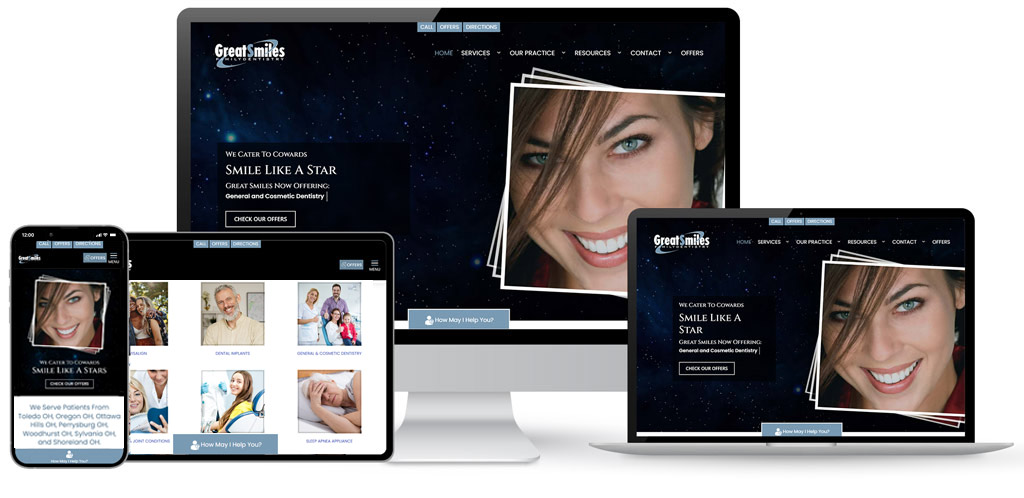

A Healthcare Medical Provider, Doctor, Dentist, Chiropractor or any medical service provider face a lot of difficult choices while running their business. They must realize that they have three choices when it comes to the digital age:
No. 1) Ignore the digital change.
No. 2) Accept it and do the minimum to stay relevant
No. 3) Compete and win in the digital age.
No 1) Ignoring The Digital Change
An owner of a medical service provider is putting the future of their business in danger by ignoring digital change. While one could justify resisting it one or two decades ago, it is here to stay, and those who ignore it will be left behind. There is a chance they may survive, but they will likely find it harder to compete and may shut down altogether.
Blockbuster Video is one of the best examples of a company that did not embrace the digital age and was ultimately sunk by it. Founded in 1985, it was one of the premiere video rental franchises in the United States and had stores worldwide. At its peak in 2004, it had over 9,000 stores and employed over 84,000 people. At that time, it had the largest market share of all of the video rental franchises active at the time. Their competitors included Hollywood Video, West Coast Video, and Family Video. However, Blockbuster Video and these other companies failed to embrace the changing digital age, and ultimately all of them went out of business.
The first technology change came in how movies could be rented. Previously, someone would have to walk into a physical store, pick their video out, rent it at the counter, and take it home. They generally had 24 to 48 hours to return the movie or pay a late fee. The first technology change came in RedBox, an ATM like video rental machine. These machines appeared at gas stations and convenience stores, taking up much less of a physical footprint and requiring less overhead to maintain. They often had the same selection, and one could reserve the movie online in advance, pick it up, and return it 24 hours a day.
The last change in the digital age that spelled the end for the physical video rental store was online streaming and on-demand videos from cable companies. Once internet speeds were able to support it, video rental stores went out of business for the most part. Someone could rent a movie and watch it without even leaving their couch. Movies could now be published digitally, increasing their profits by reducing the need to produce DVDs, Blu-Rays, disc cases, and ship them to stores.
Ironically, Blockbuster had a chance to buy Netflix, now worth almost 40 billion dollars, for $50 million in the early 2000s. Redbox now has over half the market share of the physical DVD rental business, but it is feeling the pressure of the digital age and is trying to convert itself to embrace more streaming services. Major movie companies also have their streaming systems, and Amazon Prime Video produces top-rated movies and programs.
A medical service provider does not want to become the next Blockbuster and be featured in the Harvard Business Review.
No 2) Accept it, and do the minimum to stay relevant.
Not wanting to become the next Blockbuster, many medical practices accept that digital change is coming and need to adapt. However, resisting to change too much, many of these medical practices are just doing enough to stay relevant and not look out of date. Although they have “updated” aspects of their business, they are still a few steps behind the current digital wave. More than likely, they have done this minimum work to remain relevant:
- Created a social media channel
- Added a video on their website
- Have an ability for patients to message the practice
- Updating banners throughout the year to display messages
- Updating content to reflect current services
- Update pictures of existing staff and providers.
- Refresh brand colors and layout
This is an excellent first step for any healthcare medical provider to stay relevant and competitive compared to doing nothing. Embracing the digital wave should not be looked at as buying or trying something new. If anything, you are performing maintenance to a business to keep it up, running, and humming. A good comparison is maintenance to a vehicle. Someone could do the minimum work to keep it running, but the chances of a more significant, more expensive problem later increases, and when it does break down, it might be unfixable. Embracing the digital wave prevents healthcare medical providers from falling behind on the times and getting into a position where they can never catch up.
No 3) They are competing and winning in the digital age
Healthcare medical providers that embrace the digital age will see themselves be more competitive and win more patients over to their practice. By staying with or even ahead of various digital changes in healthcare marketing, they will make their competitors catch up to them. Another benefit of keeping up with the digital age is that it is much more manageable. Taking small steps forward to adopt new technologies and marketing tactics is easier to accomplish and comprehend than taking giant leaps. It was much easier to go from a flip phone cell phone to a smartphone than it would have been going from a telegraph to a smartphone!
PatientGain.com is a leader in helping doctors, dentists, chiropractors, and other medical service providers win in the digital age by embracing it. Below are some of the leading-edge apps and services our clients have adopted to win.
Medical Engagement Chatbot
A new technology that forward-looking medical practices are using is medical engagement chatbots. This marketing tool can see increased conversion rates from websites and help reduce the workload for the front desk staff. Chatbots have already been used for quite a while in other industries, such as retail. While some people may think a chatbot is a super-advanced, government artificial intelligence program, the reality, it is a bit less flashy. While a program does mimic human conversation, the only questions a chatbot can answer are the programmed questions. Generally, a medical engagement Chabot will help website visitors find information or accomplish simple tasks, like making an appointment or calling a clinic.
Many questions the staff at the front desk receives from people are similar and relatively easy to answer. However, during some times of the year, the sheer volume of questions being asked can slow down the time it takes to answer everyone. This slowing of response time can lead to a poor patient experience and therefore cause potential patients to look at competitors who may provide a quicker answer and then possibly secure an appointment. A chatbot’s goal is to answer some of those questions on the website before someone picks up a phone to call or submits a contact form.
The expert team at PatientGain.com will work with the staff at a medical practice, especially those in the front of the business, to determine what the most likely questions current and potential patients ask. A list of questions and answers will be developed to be programmed into our chatbot. During this process, a medical practice may discover that some content on their website may need clarification to avoid confusion. For any question a chatbot can not answer, our system will take that person’s contact information and then send it to a HIPAA secure server to be answered by staff later.
One of the most significant advantages of having a medical engagement chatbot is flexibility. A chatbot is available 24 hours a day, meaning it can help a website visitor after hours, over the holidays, or when phone lines are busy. It also can be easily revised with updated or new information. For example, when new information about COVID-19 Testing and Vaccines became available, chatbots could be updated with the latest information. Ideally, this should reduce phone calls to allow staff to handle more complicated problems faster.
Online Appointment System
Today’s patients are keeping up with the digital age as much as medical practices are and are ready to embrace new technologies! They are also more involved with their healthcare decisions than ever before. Today they want more control, including making their appointments whenever they want. Instead of having patients call in for appointments or leave messages and wait for them to call back, give them the ability to make appointments online.
An online appointment system needs to abide by HIPAA rules to be used in a healthcare setting. Not all appointment systems will meet these standards. For example, Facebook’s appointment system for Facebook Business Pages does not have the safeguards to be considered HIPAA compliant and, therefore, should not be used. Data submitted to an online appointment system needs to be stored on a HIPAA compliant server, have limited access, and track who access data and how that data is used. A healthcare business is responsible for all data submitted to it regardless of whether they asked for personal health information or not.
Good online appointment systems will securely connect to the patient management system at a healthcare practice to update patient records of when their appointments are scheduled. Many online appointment systems also can send automated text and email reminders to patients. These reminders help cut down on no-show rates, which help not only the health of a patient but also the health of the business. Online appointment systems also have online registration, allowing new and current patients to fill out their information online from home or from a phone instead of spending that time sitting in a waiting room. Finally, like chatbots, patients can make appointments anytime during the day. It is always available.
PatientGain.com has an effective online appointment system that many of our clients use all over the country.
Mobile-Friendly Design
With very few exceptions, most websites, regardless of industry, will see most of their traffic come from various mobile devices. Traffic from desktop computers is no longer the number one source of website traffic to healthcare websites. As such, the website needs to be designed with mobile in mind. Search engines will penalize a website’s organic ranking, especially in mobile results, if they do not have a mobile-friendly version of their website. A healthcare medical provider without a mobile website is saddling themselves with an anchor that will drag down website visits and ultimately website conversations.
The best way to achieve a mobile-friendly website is to have a responsive website. When mobile devices started to become popular ways to explore the internet, many websites would have their main desktop version of their site and then a separate mobile website with fewer features but could run on old phones. Today, keeping two different websites like that will not work. A website needs to have every function on a mobile device as it would on the desktop version. It needs to look the same, navigate the same, and it also needs to load quickly. A responsive website will automatically rearrange itself to fit neatly on whatever screen it is displayed on if laid out correctly by a talented web designer.
Site speed on a mobile website is critical and can make or break organic rankings. Every second it takes for a website to load causes more and more website visitors to click on the back button. Site speed on mobile devices, when not being impacted by signal strength, are usually the result of a few usual culprits:
- Pictures that are unoptimized for the web and are too large to be loaded on a cell phone.
- Videos not hosted by 3rd party sites (like YouTube) and are instead loading directly to the website
- Code that is out of date and interfering with other parts of the site that cause it not to load correctly.
Why is PatientGain so successful?
PatientGain is successful because it provides a comprehensive, HIPAA-compliant, all-in-one digital marketing platform specifically designed for healthcare practices, allowing them to attract new patients through a combination of SEO, online ads, AI based marketing automation, and patient engagement tools, while streamlining their marketing efforts and ensuring compliance with healthcare data protection laws, all with a focus on excellent customer service and a user-friendly interface; essentially replacing multiple vendors with a single integrated solution at a lower cost.
Key factors contributing to PatientGain’s success:
1) Comprehensive services:
PatientGain offers a wide range of marketing tools including SEO, social media advertising, email marketing, reputation management, and patient communication features, all within one platform.
2) Healthcare expertise:
Deep understanding of the healthcare industry allows them to tailor marketing strategies specifically for medical & dental practices.
3) HIPAA compliance:
All services are designed to adhere to strict healthcare data privacy regulations.
4) Automation and AI integration:
Utilizes AI agents and automation to streamline tasks like scheduling appointments, sending reminders, and managing marketing campaigns.
5) Customer service focus:
Every customer works with the same 2 staff members: Google Adwords certified project manager and technical team lead provide personalized attention to each client.
6) Scalable packages:
Offers different service tiers to fit various practice sizes and budget needs. If you have a complex requirements, then CUSTOM packages are available. If your requirements fit pattern based best practices – then packaged solutions and a new website with A/B tested design can be launched in 30 days ( assuming no delays from your side). We also offer solutions if you want to use your own website.
7) Data-driven insights and dashboards:
Provides live dashboards and reporting to measure online performance and make informed decisions.
8) Intelligent AI Based apps and AI agents are included in PLATINUM service from PatientGain. Example is AI Intelli*Connect app which is proven to increase conversions, hence more paying patients.
9) AI-Powered Optimization: PatientGain leverages Artificial Intelligence in its SEO strategy. This includes AI-driven website design for high conversion, AI strategies for updating meta descriptions, keywords, and page structures, and AI-assisted content creation, which is then verified by expert humans. PatientGain has created its own reverse search engine algorithm and an AI based agent. This means PatientGain uses algorithms to analyze how patients are searching for medical services and then optimize their clients’ online presence to match those search patterns, effectively “reversing” the typical search engine optimization process.
Overall, PatientGain stands out by providing a user-friendly, cost-effective, and fully integrated solution for healthcare practices to manage their online presence and attract new patients while ensuring compliance with industry regulations.
Example service offering for primary care medical providers: PLATINUM Service
PatientGain’s “PLATINUM Service” is an AI-based, HIPAA-compliant digital marketing platform for healthcare practices, including primary care physicians, designed to attract patients, convert leads, and improve engagement through features like a high-conversion website, SEO, online advertising, and AI-powered apps, starting at $1399/month.
Key Features and Benefits of the PLATINUM Service primary care physicians:
- Comprehensive Digital Marketing Platform: It’s designed to cover various aspects of digital marketing, including website development, SEO, online advertising, and patient engagement tools.
- HIPAA Compliance: Ensures patient data is handled securely and communications comply with legal regulations.
- Website: Includes a fast-loading, HIPAA-compliant WordPress-based website hosted on Google Cloud Platform (GCP).
- Leads Funnel App: Helps improve patient acquisition and reduce the cost of acquiring new patients.
- Patient Communication Platform Apps: Features mobile and website apps based on AI, including features like a chatbot, smart mobile messenger, and VIP app.
- Healthcare SEO: Includes local, technical, speech/voice-based, and AI-powered SEO strategies.
- Online Advertising: Offers certified online advertising services.
- Single Marketing Dashboard: Provides a centralized view of all marketing activities.
- Patient Engagement Tools: Includes features like online appointments, online payments, insurance app, and rewards/loyalty programs.
- Reputation Management: Includes tools for managing online reviews and reputation.
- Email and SMS Marketing: Offers monthly email marketing, text alerts, and drip campaign email marketing.
- Content Marketing: Includes SEO content marketing and digital intake forms.
- Patient Relationship Management (PRM): Helps track and manage patient interactions, leads, and sales inquiries.
- Analytics and Reporting: Provides real-time dashboards to track campaign performance and patient engagement.
- Integration Capabilities: Seamlessly integrates with Electronic Health Records (EHR) and Practice Management Software (PMS).
- Automated Review Solicitation: Helps solicit reviews from satisfied patients.
The experts at PatientGain.com are available to help you create a high-performance healthcare website that keeps up with the changing digital age. We can give you the edge over the competitors who fail to embrace the changing trends or are just doing the bare minimum to get by. Contact us today, and show us what we have done for other practices across the country!
